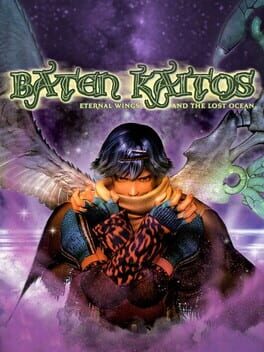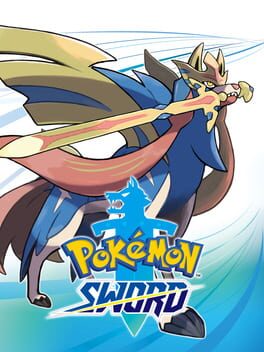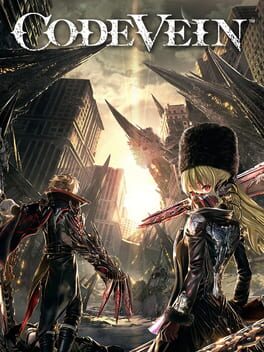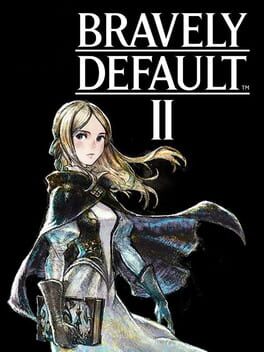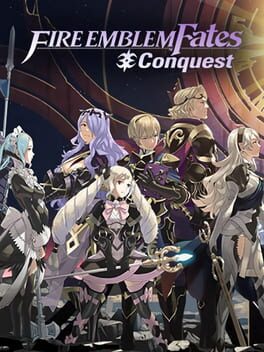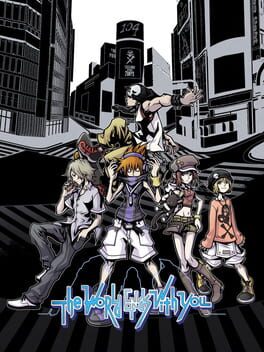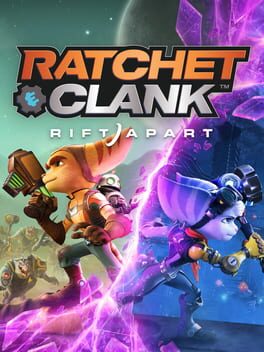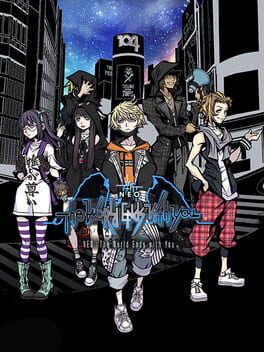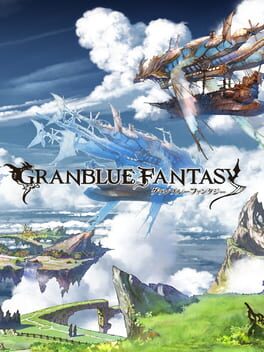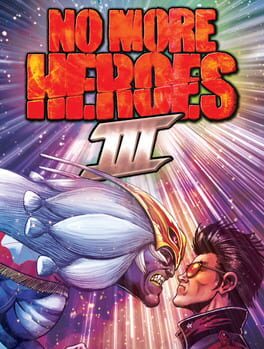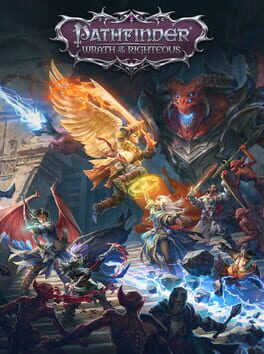Cerb
No one really remembers Baten Kaitos in spite of the huge fame the studio behind it gets for their much lauded Xeno series of games, either because of the platform the game is on or the unbelievably bad voice acting and utterly bizarre combat system acting as an, admittedly, high barrier to entry. However, what this game lacks in modern values such as accessibility in gameplay (and a respect for the player's time) is an utterly unique and beautiful transitional JRPG that iterates upon the last generation of JRPGs by taking advantage of what new hardware can bring and managing to take off as a distinctive game even to this day. No other game does a card battle RPG system quite like it, nor do any other card battle RPGs being anywhere near as good.
Baten Kaitos retains, or possibly births given it's release date, a lot of storytelling quirks that would be present in future Xeno games too, taking an utterly unique premise with its world, and giving you story beats that twist and turn in fantastic ways as the story progresses with an endearing cast of characters. It really should be experienced for yourself, and nowadays there are a good number of ways you can play this game not on the original hardware so I highly encourage anyone to check out this game and not let it be lost to a wikipedia article or some dude's reddit post or backloggd review.
Baten Kaitos retains, or possibly births given it's release date, a lot of storytelling quirks that would be present in future Xeno games too, taking an utterly unique premise with its world, and giving you story beats that twist and turn in fantastic ways as the story progresses with an endearing cast of characters. It really should be experienced for yourself, and nowadays there are a good number of ways you can play this game not on the original hardware so I highly encourage anyone to check out this game and not let it be lost to a wikipedia article or some dude's reddit post or backloggd review.
2019
Persona 5 Royal improves on Persona 5 in every way, unfortunately this way is so disconnected storywise that it almost acts as an entirely seperate experience to the main game, being thematically an almost condemnation of the main game's storyline due to how disjointed the two narratives are. However, it is a superior storyline in almost every way, discarding many of the awful villains employed before in favour of one that had some pathos and connection to the themes of the Persona series as a whole of the exploration of the self, rather than the exploration of society the original Persona 5 opted for.
Gameplay takes a simultaneous leap in interesting ideas and a large stumble in difficulty due to said ideas, the new systems at play all make an easy experience absolutely trivial, an example being Persona traits add a lot more customisation to personalising a Persona's playstyle and ability usage but it becomes apparent this system isn't balanced at all, like giving Alice the ability to make instant death spells cost no SP, resulting in Alice killing every encounter that doesn't have an immunity to death instantly and cancelling out most late game random encounters. Ultimately, Persona 5 Royal shines in what it doesn't share with it's predecessor, and what it does share looks even worse in comparison.
Gameplay takes a simultaneous leap in interesting ideas and a large stumble in difficulty due to said ideas, the new systems at play all make an easy experience absolutely trivial, an example being Persona traits add a lot more customisation to personalising a Persona's playstyle and ability usage but it becomes apparent this system isn't balanced at all, like giving Alice the ability to make instant death spells cost no SP, resulting in Alice killing every encounter that doesn't have an immunity to death instantly and cancelling out most late game random encounters. Ultimately, Persona 5 Royal shines in what it doesn't share with it's predecessor, and what it does share looks even worse in comparison.
2019
This review includes the DLC
With all of Game Freak's cards on the table it becomes very clear that they have no clue what they want this game to be. It's very easy to say that they were lazy but that misses the point of the fundamental disconnect that Game Freak has with their audience. Disregarding the omissions compared to prior games in the series, there is no clear vision for this game. The base game touts an open world area that the developers are clearly proud of when it permeates so many aspects of marketing and gameplay with the many endeavors towards co-operative player raids and the like, but clearly the focus was misguided at best when there are so many crippling design issues that limit what they can even do with what they have.
This is no more prevalent than the game's swan song, the Crown Tundra which boasts a legendary hunt, the best open world section to date, and a new type of co-operative content, and all three of which managed to exhibit the same type of flaws as their base game. They all share the same level of mismanagement and misunderstanding of the concepts behind good co-op design of their content often times making their nature of group content a hinderance more than anything, and this kind of example is emblematic of the entire Pokemon Sword and Shield experience. Honestly, even as a casual Pokemon fan I can't even imagine recommending this game when there are so much better Pokemon experiences out there and this game won't offer you anything new.
With all of Game Freak's cards on the table it becomes very clear that they have no clue what they want this game to be. It's very easy to say that they were lazy but that misses the point of the fundamental disconnect that Game Freak has with their audience. Disregarding the omissions compared to prior games in the series, there is no clear vision for this game. The base game touts an open world area that the developers are clearly proud of when it permeates so many aspects of marketing and gameplay with the many endeavors towards co-operative player raids and the like, but clearly the focus was misguided at best when there are so many crippling design issues that limit what they can even do with what they have.
This is no more prevalent than the game's swan song, the Crown Tundra which boasts a legendary hunt, the best open world section to date, and a new type of co-operative content, and all three of which managed to exhibit the same type of flaws as their base game. They all share the same level of mismanagement and misunderstanding of the concepts behind good co-op design of their content often times making their nature of group content a hinderance more than anything, and this kind of example is emblematic of the entire Pokemon Sword and Shield experience. Honestly, even as a casual Pokemon fan I can't even imagine recommending this game when there are so much better Pokemon experiences out there and this game won't offer you anything new.
While Moon has been cited as the inspiration for many experiences, most notably Undertale, it manages to be an experience unlike those games in very nuanced and surprising ways, especially considering how far back a progenitor this game is to video game genre deconstruction tropes and common themes. Normally when a game seeks out to satirise a genre it usually comes off as pessimistic, admittedly this is due to the nature of such satires bringing in meta-commentary about the disparity between the world in a video game and the world outside, but Moon struck me as a very optimistic experience despite its premise.
Yes, it features the classic genre deconstruction trope of classical style protagonists in video games coming off more murderous and psychopathic in a more realistic setting but it's not actually where the game chooses to focus, even that trope is played with in that most of the townspeople mock the hero for their behaviour and regard them as a general nuisance more than anything. When the game pulls back and allows you free exploration you find a remarkable ecosystem of characters with their own sets of routines, special events, and reactions to other events and items in a uniquely impressive way, doubly so in lieu of the time and platform it was originally developed for.
These NPCs are where the real optimism of the game shines through, with how they interact with one another and the player still coming off as lighthearted and, most of all, never meanspirited. There are mean characters for sure, such as the old man in the windmill and the hero but both are part of the protagonist's journey to find love, a journey that is the main focus of the game as you find love you also spread love which is a wholly beautiful and optimistic view on a more grounded and mundane kind of RPG quest. Overall, this game is a wonderful adventure, more point and click adventure style than RPG admittedly, that's well worth visiting even now as a timeless classic that will stay with you long after you reach the ending.
Yes, it features the classic genre deconstruction trope of classical style protagonists in video games coming off more murderous and psychopathic in a more realistic setting but it's not actually where the game chooses to focus, even that trope is played with in that most of the townspeople mock the hero for their behaviour and regard them as a general nuisance more than anything. When the game pulls back and allows you free exploration you find a remarkable ecosystem of characters with their own sets of routines, special events, and reactions to other events and items in a uniquely impressive way, doubly so in lieu of the time and platform it was originally developed for.
These NPCs are where the real optimism of the game shines through, with how they interact with one another and the player still coming off as lighthearted and, most of all, never meanspirited. There are mean characters for sure, such as the old man in the windmill and the hero but both are part of the protagonist's journey to find love, a journey that is the main focus of the game as you find love you also spread love which is a wholly beautiful and optimistic view on a more grounded and mundane kind of RPG quest. Overall, this game is a wonderful adventure, more point and click adventure style than RPG admittedly, that's well worth visiting even now as a timeless classic that will stay with you long after you reach the ending.
2019
Code Vein is one of the most incredibly insane and laughably bad games I've ever played. It somehow jacks up everything that was bad about the Souls games to an incredibly degree that it's hard not to see as a parody of souls games and anime. Full disclosure but I also played most of the game in multiplayer which furthered added to the experience of playing an interactive version of The Room where I can see the passion seeping through every aspect of this game but misdirected passion much like Tommy Wiseau himself.
The level design is some of the worst I had the pleasure of laughing the whole way through with my mates, so many fuck you moments I have to assume the developers were sitting at their desks with the biggest shit eating grins on their faces going "HEHEHEH IM SO SMART" and I lapped up every unseeable death pit and enemy spawning from a wall. It is incredibly impressive for a game to have made a map that is useless in 2019, the map doesn't have layers and a lot of the levels vertically stack across large distances so the map becomes a liability more than anything.
This game is really seen to be believed how ludicrously bad it is, give it a shot and drink in all the awful map design, terrible combat choices, and baffling systems that were just put in because they looked cool while misunderstanding everything that a good soulsborne does right
The level design is some of the worst I had the pleasure of laughing the whole way through with my mates, so many fuck you moments I have to assume the developers were sitting at their desks with the biggest shit eating grins on their faces going "HEHEHEH IM SO SMART" and I lapped up every unseeable death pit and enemy spawning from a wall. It is incredibly impressive for a game to have made a map that is useless in 2019, the map doesn't have layers and a lot of the levels vertically stack across large distances so the map becomes a liability more than anything.
This game is really seen to be believed how ludicrously bad it is, give it a shot and drink in all the awful map design, terrible combat choices, and baffling systems that were just put in because they looked cool while misunderstanding everything that a good soulsborne does right
1997
2021
In a strange way, Bravely Default II manages to be a regression in so many ways from the previous entries. Starting mechanically from the battle system which employs a turn gauge that is far more flawed in execution than the original turn system. The other new addition to the core battle system is the counter system where enemies perform specific actions in response to certain triggers, which sounds great in theory, but in execution by around the halfway point of the game you're being bombarded with bosses that have the "counter every ability" trigger. Combined with the turn gauge system some of the battles can involve enemies taking 3-4 turns due to gaining BP from counters before your highest speed character can even take 1 turn.
The side quests in this game are some of the worst I've played in JRPG history, they're even lower than MMORPG sidequests. At least in MMORPGS you get flavour text or something to give you context on why you're doing these bitch quests for people, one amazing npc in this game just tells you "I hate goblin archers!" before the game prompts you to go kill 4 goblin archers. It's ludicrous to forgive content like this just because its optional, especially in a classic style jrpg where exploration is meant to be mechanically rewarded with a decent reward, and there are so many side quests in this game that give you nothing of value.
The story is also a huge step backward, crazily enough, the main cast is okay, with the exception of the main protagonist, Seth, who is an lifeless, boring, flat character insert that just gets incredible powers through a completely nebulous chosen one plot. The side characters also share the same fate as Seth, with the saving grace that they appear for far less time than Seth does. The games presentation is also super flawed, and ruins the emotional impact scenes are meant to have. The cutscene direction is extremely weak except for the last few cutscenes in the game and not even the music can save those scenes from feeling completely undercooked.
Overall Bravely Default II had me oddly perplexed at how little it has to offer, even in the Switch's limited library of exclusive JRPGs. Despite having very low expectations going in, especially after Bravely Second, I find myself astounded by how it has broken those expectations by delivering me one of the most undercooked, underdeveloped, and forgettable JRPG's I've ever played.
The side quests in this game are some of the worst I've played in JRPG history, they're even lower than MMORPG sidequests. At least in MMORPGS you get flavour text or something to give you context on why you're doing these bitch quests for people, one amazing npc in this game just tells you "I hate goblin archers!" before the game prompts you to go kill 4 goblin archers. It's ludicrous to forgive content like this just because its optional, especially in a classic style jrpg where exploration is meant to be mechanically rewarded with a decent reward, and there are so many side quests in this game that give you nothing of value.
The story is also a huge step backward, crazily enough, the main cast is okay, with the exception of the main protagonist, Seth, who is an lifeless, boring, flat character insert that just gets incredible powers through a completely nebulous chosen one plot. The side characters also share the same fate as Seth, with the saving grace that they appear for far less time than Seth does. The games presentation is also super flawed, and ruins the emotional impact scenes are meant to have. The cutscene direction is extremely weak except for the last few cutscenes in the game and not even the music can save those scenes from feeling completely undercooked.
Overall Bravely Default II had me oddly perplexed at how little it has to offer, even in the Switch's limited library of exclusive JRPGs. Despite having very low expectations going in, especially after Bravely Second, I find myself astounded by how it has broken those expectations by delivering me one of the most undercooked, underdeveloped, and forgettable JRPG's I've ever played.
Something of note about the Fire Emblem series is that it can never pull off a game where the gameplay is of equal quality to the writing, there are FE games with amazing writing, with trivial gameplay and on the other end of the spectrum you have this game.
As any person with even a passing familiarity will tell you, this games main story is worthless. The supports in this game are decent but, frankly, are damaged by a shoddy localisation job that has no interest in preserving the little character writing this game had with some baffling changes made to characterisation and tonal changes that completely butcher a character like Beruka for example. With that out of the way, Fire Emblem Fates Conquest is one of the best TRPG gameplay experiences ever crafted with incredible map design, based around systems that aid player momentum, and a rare balance of not having system bloat (a prevalent hallmark of the genre) while also being complex enough for a personalised and engaging experience.
The key strength this game has over other Fire Emblems is the map design, dragon veins (once the game moves onto conquest only maps) are the key feature in many chapters where they're used to either add an extra layer of consideration for the player to strategise around, or to give the player a new tool to incorporate into their strategies to gain the tactical advantage the enemy may not have. Coupled with the games weighting towards player phase engagements (due to debuffing weapons, skills, and an incentive to at least seriously wound enemies on your turn) and the brutal difficulty (one of the few Fire Emblem games that pull off lunatic with more smart enemy placements and different skillsets rather than stat bloat) combine together to make some of the most well thought out and executed map design of the genre. Highly recommend people to check this out since its often lumped with it's peers, and overlooked as a result.
As any person with even a passing familiarity will tell you, this games main story is worthless. The supports in this game are decent but, frankly, are damaged by a shoddy localisation job that has no interest in preserving the little character writing this game had with some baffling changes made to characterisation and tonal changes that completely butcher a character like Beruka for example. With that out of the way, Fire Emblem Fates Conquest is one of the best TRPG gameplay experiences ever crafted with incredible map design, based around systems that aid player momentum, and a rare balance of not having system bloat (a prevalent hallmark of the genre) while also being complex enough for a personalised and engaging experience.
The key strength this game has over other Fire Emblems is the map design, dragon veins (once the game moves onto conquest only maps) are the key feature in many chapters where they're used to either add an extra layer of consideration for the player to strategise around, or to give the player a new tool to incorporate into their strategies to gain the tactical advantage the enemy may not have. Coupled with the games weighting towards player phase engagements (due to debuffing weapons, skills, and an incentive to at least seriously wound enemies on your turn) and the brutal difficulty (one of the few Fire Emblem games that pull off lunatic with more smart enemy placements and different skillsets rather than stat bloat) combine together to make some of the most well thought out and executed map design of the genre. Highly recommend people to check this out since its often lumped with it's peers, and overlooked as a result.
Shibuya is often cited as the epicentre for youth culture, at least at it's peak in the 2000s and early 2010s, many aspects of this district embody this from their shopping centres, to the type of music you would hear from the giant billboard television advertising loud jpop to a massive crosswalk of people walking every direction, surrounded by art trying to speak to someone, no matter how manufactured, or genuine a message it is. All of this is embodied in The World Ends With You, a remarkably unique game because of how it incorporates its style, aesthetics, and cultural history into every element it can. It is impossible to seperate this game from the culture and time it belongs to, ironically this makes it timeless in a lot of ways as a time capsule to an era where punk and angst manifested into noise, bombast, and individuality.
Remarkably, The World Ends with You deftly weaves this into its mechanics, with fashion being, appropriately, stat boosting "armour" that varies in effectiveness with the varying trends of fashion in each district, and pins (think more badges) which are the attacks of the game. While a relatively negligible mechanic in practice, particularly in post-game due to the large assortment of extremely powerful unbranded clothes, it cannot be denied that it has a purpose extended beyond gameplay and weaves itself into the foundation of the game. The way the game's foundation of Shibuya manifests even further into its story, while on a surface level it can feel like a dated story about an angsty teen angry at the world learning to see past himself and look at other people as well, there is a lot of subtext present about the way his eyes open up, even beyond his ability to develop friendships once he focuses more on other people, such as the way he views at art, fashion, and individual expression in general.
The key in what makes The World Ends with You one of my favourite games in how all the little details contribute to the greater themes and ideas. A detail I've often seen overlooked are the thoughts you can mindread from people around Shibuya, while you may look at a few thoughts here and there, I find most players would only beeline towards the relevant thoughts for story progression but there are a surprising number of unique thoughts spread across the many generic npcs in the world. Again, this directly loops into our main character's realisation about the people outside his own peripheral vision, as the player perceives people outside the main cast, or even the side cast, and their thoughts permeating the players view, as this mindreading view is required to encounter enemies outside of bosses.
The World Ends with You is getting a sequel in a few months, but whether that game is good or not won't affect how this game is still a beautiful time capsule of an experience, that is well worth your time if you have even a passing interest in anything that Shibuya was about before it's, arguable, modern corporatization and sanitisation. Feel free to post copium if NEO: TWEWY sucks.
Remarkably, The World Ends with You deftly weaves this into its mechanics, with fashion being, appropriately, stat boosting "armour" that varies in effectiveness with the varying trends of fashion in each district, and pins (think more badges) which are the attacks of the game. While a relatively negligible mechanic in practice, particularly in post-game due to the large assortment of extremely powerful unbranded clothes, it cannot be denied that it has a purpose extended beyond gameplay and weaves itself into the foundation of the game. The way the game's foundation of Shibuya manifests even further into its story, while on a surface level it can feel like a dated story about an angsty teen angry at the world learning to see past himself and look at other people as well, there is a lot of subtext present about the way his eyes open up, even beyond his ability to develop friendships once he focuses more on other people, such as the way he views at art, fashion, and individual expression in general.
The key in what makes The World Ends with You one of my favourite games in how all the little details contribute to the greater themes and ideas. A detail I've often seen overlooked are the thoughts you can mindread from people around Shibuya, while you may look at a few thoughts here and there, I find most players would only beeline towards the relevant thoughts for story progression but there are a surprising number of unique thoughts spread across the many generic npcs in the world. Again, this directly loops into our main character's realisation about the people outside his own peripheral vision, as the player perceives people outside the main cast, or even the side cast, and their thoughts permeating the players view, as this mindreading view is required to encounter enemies outside of bosses.
The World Ends with You is getting a sequel in a few months, but whether that game is good or not won't affect how this game is still a beautiful time capsule of an experience, that is well worth your time if you have even a passing interest in anything that Shibuya was about before it's, arguable, modern corporatization and sanitisation. Feel free to post copium if NEO: TWEWY sucks.
It's a Ratchet and Clank game so of course it plays well, although I do have to express disappointment with the level design and story. The level design is really basic with really easy exploratory puzzles for optional collectibles, there really isn't anything challenging to do in the game optionally. The arena is also boring, as its straight arena wave challenges with minor permutations with not much variation.
The story and writing is definitely a step down from the original trilogy, and A Crack in Time, I'm not really sure what the intention of the story really is here to begin with, it's all rather basic with not much going on for it. At first it seems like a celebration of Ratchet and Clank, but it really isn't, it ends up being just a basic underdogs against the villain story, but the villains here are pretty awful too. The main villain this time around is set up really well, and I assume the intention was that they were actually pathetic, but there really wasn't anything too threatening about them in the end anyway, even with an all powerful weapon.
It's still a good game, and a very impressive technical achievement but where's this games legacy once that technical achievement wears off? In the end, that's definitely my biggest issue with this entry, there's not much going on for it. It doesn't have the sharp writing of the original trilogy, but it doesn't have much character exploration like the future trilogy either.
The story and writing is definitely a step down from the original trilogy, and A Crack in Time, I'm not really sure what the intention of the story really is here to begin with, it's all rather basic with not much going on for it. At first it seems like a celebration of Ratchet and Clank, but it really isn't, it ends up being just a basic underdogs against the villain story, but the villains here are pretty awful too. The main villain this time around is set up really well, and I assume the intention was that they were actually pathetic, but there really wasn't anything too threatening about them in the end anyway, even with an all powerful weapon.
It's still a good game, and a very impressive technical achievement but where's this games legacy once that technical achievement wears off? In the end, that's definitely my biggest issue with this entry, there's not much going on for it. It doesn't have the sharp writing of the original trilogy, but it doesn't have much character exploration like the future trilogy either.
This review contains spoilers
The original game was lightning in a bottle, the way it impresses will only have ever impressed the first and only time due to how unique of a game it was. Fortunately NTWEWY does not fall into the trap that so many nostalgic returns of the past decade have fallen into, it claws its way into being its own entity, and it succeeds in being a great follow up, and game in its own right.
Starting off with the gameplay, which is probably the weakest aspect for me, the new system is honestly pretty good, if not for a few quirks that hold it back, namely enemy design and frustrating dodging mechanics. While there were good bosses in this game, many of the multi phase bosses fell into the trap of having fucking long ass phase transitions that really hampered my enjoyment when retrying failed attempts. The dodging is probably the worst part of the new gameplay for me, since pressing other pin buttons flies the camera over to the character using that pin, in the heat of battle dodging and pressing a pin on hard mode often leads to lethal consequences that I cannot say is on the part of the player. The side quests are also mostly not very interesting in this game, oft being dives into negative human feelings and helping them move on, while I could see them being in-line with the minor theme of moving on while change is happening around you, reflective of how much Shibuya has changed since 14 years ago, these side quests are still lacking in any depth to meaningfully connect to these themes like the main story does.
The real meat of this game, much like the last for me, is the story and setting and NTWEWY delivers, although I'd have to sit on whether it was as strong as the original entry. The main character Rindou captures a very different kind of modern angst compared to Neku from the previous, he embodies a very relatable modern sensibility of indecisiveness and not putting yourself out there which often gets him into situations where he's forced to turn back time to repeat his actions. A strong point in this game's favour is how Rindou never really invites comparison to Neku, they're completely different people and they each have their own ways of devising a solution and capability to achieve it. Rindou also embodying the meaning of "The World Ends with You" in a similar but different way from Neku also demonstrates how this game is worthy of the series name, while the phrase applied to Neku to mean expand your horizons, for Rindou it means the similar "open yourself up" something he consistently struggles to do due to his insecurity and indecisiveness throughout the story. Fret and Nagi are also good characters, although their character examinations come a bit too late, and (Nagi especially) are fairly abrupt and underexplored compared to the partners from the first game. However, Fret's storyline about his beliefs on being genuine versus being what people want you to be rings strong in the image focused world that has always surrounded Shibuya. Rounding out the party are returning characters Beat, Neku, Minamimoto, and newly introduced Reaper Shoka (Best girl).
A pitfall a modern follow up to an old game often runs into is how it beholds itself in reverence to the old game, and letting that get in the way of trying to be it's own entity and the game cleverly avoids that in how it positions the returning characters. Minamimoto is the crutch and mentor that gives the group the confidence to tackle the first week, and his absence is what causes the flaws of the individuals of the group to display, which is why the next party member is Beat who is someone that has overcome themselves and offer guidance and mentorship in a way I never thought the himbo could. Beat's positive vibes highlights not only how the people in the previous game had grown up and moved on from their dilemmas, but can actively wedge themselves into a group struggling through similar issues and give them guidance. Neku also fulfils a similar purpose, and it's very pleasing to see what a calming and confident presence he's become in this game, contrasting to his depiction in the awful A New Day from the switch re-release.
The aspect of the game that surprised me most is the final week, and makes me wonder when this game started development. Perhaps it is a projection, but the week being about a type of Noise called plague noise and spreading rapidly thoughout the city making people depressed, listless, and depriving the city of the energy it once had sounds very familiar to me, in 2021. Yes, people bustle like there isn't a pandemic but I'd be surprised if the pandemic had nothing to do with the direction the story takes in this game, and the soliloquys from the characters about the state of the city in the face of this syndrome hits close to home, as someone that has a love of Shibuya and what it represents to culture at large. If there's anything the developers of this game had managed to reproduce, it's their love for this city. Detail is still abundant with all the modern additions to Shibuya in beautiful detail. Much like real life fashion brands, while there are returning ones, new brands have replaced a lot of the older ones, although it maintains the same theme of Zodiac animals.
The game has two main themes I've surmised: Taking things into your own hands and not relying on a higher power, and trying to surmount a system working against you. In this game, the Reaper's game is rigged and the main three find themselves relying on more powerful people than them to solve their issues for them. Week 2 begins with the cast concerned that they will be erased simply because they don't have Minamimoto with them despite the three having their own unique abilities that they could not have navigated the first week without. As I've drunkenly ranted about to my friends before, the feeling of being part of a system stacked against you strikes very true, especially nowadays with so much out of your control, it's very easy to just accede to whatever higher power dictates it all. Staying to it's punk roots, this game defiantly and proudly shouts to keep pushing and eventually you'll find your way forward, and I can't help but admire this game for such a wonderful and relevant message, it's hard to not smile and cheer when the characters persistently trudge through a blatantly rigged system and come out on top.
The original game is one that I've analysed and immersed myself into completely. While I don't think this entry is as strong as that one, it's entirely possible with more time and research the hidden detail of this game will shine just as brightly as it's predecessor, but for what I just experienced, it was well worth my time and the follow up to the original I never thought I'd have.
And the music fucking slaps, of course.
Starting off with the gameplay, which is probably the weakest aspect for me, the new system is honestly pretty good, if not for a few quirks that hold it back, namely enemy design and frustrating dodging mechanics. While there were good bosses in this game, many of the multi phase bosses fell into the trap of having fucking long ass phase transitions that really hampered my enjoyment when retrying failed attempts. The dodging is probably the worst part of the new gameplay for me, since pressing other pin buttons flies the camera over to the character using that pin, in the heat of battle dodging and pressing a pin on hard mode often leads to lethal consequences that I cannot say is on the part of the player. The side quests are also mostly not very interesting in this game, oft being dives into negative human feelings and helping them move on, while I could see them being in-line with the minor theme of moving on while change is happening around you, reflective of how much Shibuya has changed since 14 years ago, these side quests are still lacking in any depth to meaningfully connect to these themes like the main story does.
The real meat of this game, much like the last for me, is the story and setting and NTWEWY delivers, although I'd have to sit on whether it was as strong as the original entry. The main character Rindou captures a very different kind of modern angst compared to Neku from the previous, he embodies a very relatable modern sensibility of indecisiveness and not putting yourself out there which often gets him into situations where he's forced to turn back time to repeat his actions. A strong point in this game's favour is how Rindou never really invites comparison to Neku, they're completely different people and they each have their own ways of devising a solution and capability to achieve it. Rindou also embodying the meaning of "The World Ends with You" in a similar but different way from Neku also demonstrates how this game is worthy of the series name, while the phrase applied to Neku to mean expand your horizons, for Rindou it means the similar "open yourself up" something he consistently struggles to do due to his insecurity and indecisiveness throughout the story. Fret and Nagi are also good characters, although their character examinations come a bit too late, and (Nagi especially) are fairly abrupt and underexplored compared to the partners from the first game. However, Fret's storyline about his beliefs on being genuine versus being what people want you to be rings strong in the image focused world that has always surrounded Shibuya. Rounding out the party are returning characters Beat, Neku, Minamimoto, and newly introduced Reaper Shoka (Best girl).
A pitfall a modern follow up to an old game often runs into is how it beholds itself in reverence to the old game, and letting that get in the way of trying to be it's own entity and the game cleverly avoids that in how it positions the returning characters. Minamimoto is the crutch and mentor that gives the group the confidence to tackle the first week, and his absence is what causes the flaws of the individuals of the group to display, which is why the next party member is Beat who is someone that has overcome themselves and offer guidance and mentorship in a way I never thought the himbo could. Beat's positive vibes highlights not only how the people in the previous game had grown up and moved on from their dilemmas, but can actively wedge themselves into a group struggling through similar issues and give them guidance. Neku also fulfils a similar purpose, and it's very pleasing to see what a calming and confident presence he's become in this game, contrasting to his depiction in the awful A New Day from the switch re-release.
The aspect of the game that surprised me most is the final week, and makes me wonder when this game started development. Perhaps it is a projection, but the week being about a type of Noise called plague noise and spreading rapidly thoughout the city making people depressed, listless, and depriving the city of the energy it once had sounds very familiar to me, in 2021. Yes, people bustle like there isn't a pandemic but I'd be surprised if the pandemic had nothing to do with the direction the story takes in this game, and the soliloquys from the characters about the state of the city in the face of this syndrome hits close to home, as someone that has a love of Shibuya and what it represents to culture at large. If there's anything the developers of this game had managed to reproduce, it's their love for this city. Detail is still abundant with all the modern additions to Shibuya in beautiful detail. Much like real life fashion brands, while there are returning ones, new brands have replaced a lot of the older ones, although it maintains the same theme of Zodiac animals.
The game has two main themes I've surmised: Taking things into your own hands and not relying on a higher power, and trying to surmount a system working against you. In this game, the Reaper's game is rigged and the main three find themselves relying on more powerful people than them to solve their issues for them. Week 2 begins with the cast concerned that they will be erased simply because they don't have Minamimoto with them despite the three having their own unique abilities that they could not have navigated the first week without. As I've drunkenly ranted about to my friends before, the feeling of being part of a system stacked against you strikes very true, especially nowadays with so much out of your control, it's very easy to just accede to whatever higher power dictates it all. Staying to it's punk roots, this game defiantly and proudly shouts to keep pushing and eventually you'll find your way forward, and I can't help but admire this game for such a wonderful and relevant message, it's hard to not smile and cheer when the characters persistently trudge through a blatantly rigged system and come out on top.
The original game is one that I've analysed and immersed myself into completely. While I don't think this entry is as strong as that one, it's entirely possible with more time and research the hidden detail of this game will shine just as brightly as it's predecessor, but for what I just experienced, it was well worth my time and the follow up to the original I never thought I'd have.
And the music fucking slaps, of course.
2014
2021
In many ways Kingmaker was the modern Baldur's Gate, a faithful, ambitious, and rough implementation of tabletop roleplaying into a video game setting. Wrath of the Righteous is the modern Baldur's Gate 2, with much sharper writing, many gameplay tweaks, and an amazing reactive plot that weighs every decision and path you take meaningfully, allowing for a true role playing experience.
Starting off with the negatives, I don't love the encounter design in this game, admittedly there's a high chance im not utilising the mechanics at play to their fullest with every encounter (for reference I played a slightly modified normal difficulty) but there was a high occurrence of just turning a corner and finding your frontliner suddenly getting obliterated by some jackoff throwing 8 axes at the start of battle with a high initiative. Loot is also a bit inconsistent, there's a high amount of unique great loot, but as someone that focused purely on my MC using a dueling sword I legitimately could not find one come the penultimate act, leaving them relying mostly on the fact that they are the MC to carry that weight.
This game at its present state is also buggy, unsurprising given their last game, but still I ran into many bugs including not being able to ride my giant centipede, even though it was my mount which still devastates me to think about. As of the time of this writing, I can't even see the credits since it crashes upon them triggering for me. If bugs annoy you, I do recommend waiting down the line for a more polished experience like its predecessor.
The biggest and most glaring narrative has to be the crusade portion, or more specifically the crusade battles which take the form of a Heroes of Might and Magic rip off but there's no real strategy here, its all in the numbers and it takes a decade and honestly the actual battles themselves aren't worth your time, especially come chapter 5 where the game has the audacity to reset your armies. This portion isn't all bad though, decision making with the council is even stronger than Kingmaker's iteration, where there are more people contributing to discussion and potential solutions, it feels impactful with some strong storylines running throughout each council's major discussions. I would say don't turn on the Crusade auto mode however since it bars you from something as important as creating fast travel points, I do recommend downloading the mod Combat Relief to skip the battles but still engage with Crusade mode as the auto mode bars you off from certain Mythic Paths and other such important parts. I won't lie, crusade mode does pad your playtime out, and it is a drag so let's talk the best part of the game, the companions.
The companions in this game are fantastic, the writing quality for them is very strong and they are all fleshed out well with fantastic conclusions to every companion questline I finished. Riding off the main criticism of Kingmaker, the companions here regularly interact with each other, giving a proper idea of the relationships between party members. Western RPGs are normally pretty terrible at inter-party relationships, normally opting for an orbiting around the main character which WotR does not suffer from. Companion comments on events are normally further commented on by another, resulting in a back and forth mid conversation without involving the main character while adhering to character relationships, and it adds a crazy amount of personality to everyone. Yes, CRPGs have had ambient conversations between party members before like Dragon Age, but Wrath of the Righteous conversations being interspersed between every conversation gives them much more life than most western RPGs can claim.
Owlcat Games have also outdone themselves on the adaptational front, taking a malleable set of books intended for every Dungeon Master to put their own spin on to craft an excellent narrative that takes significant creative license where they could to completely overhaul the villains to function as an excellent story in it's own right, 10 excellent stories really since every mythic path (the system that sees your player character becoming unto a god) sees significant changes in main character identity and ambition, with a significant mythic questline to follow for each path boasting a different ending, and possibly a different final boss battle too in some cases. For this playthrough I played an aeon, an arbiter of cosmic space-time law thinking I'd be some sort of time cop, where I kinda am, but also my character frequently debated within themselves about the true nature of justice, impartiality and what it truly means to be a being with that kind of power. The aeon itself boasts several different endings depending on how your character combats this question, and I have to say the one I got for achieving what my mirror reflection decided was a true judge of cosmic law was an impressively bittersweet affair with significant gravitas and emotion behind what I had to do.
Highly recommend this game to any CRPG enthusiasts, this is one that should be remembered down the line along with the greats, and an incredible follow-up to Kingmaker.
Starting off with the negatives, I don't love the encounter design in this game, admittedly there's a high chance im not utilising the mechanics at play to their fullest with every encounter (for reference I played a slightly modified normal difficulty) but there was a high occurrence of just turning a corner and finding your frontliner suddenly getting obliterated by some jackoff throwing 8 axes at the start of battle with a high initiative. Loot is also a bit inconsistent, there's a high amount of unique great loot, but as someone that focused purely on my MC using a dueling sword I legitimately could not find one come the penultimate act, leaving them relying mostly on the fact that they are the MC to carry that weight.
This game at its present state is also buggy, unsurprising given their last game, but still I ran into many bugs including not being able to ride my giant centipede, even though it was my mount which still devastates me to think about. As of the time of this writing, I can't even see the credits since it crashes upon them triggering for me. If bugs annoy you, I do recommend waiting down the line for a more polished experience like its predecessor.
The biggest and most glaring narrative has to be the crusade portion, or more specifically the crusade battles which take the form of a Heroes of Might and Magic rip off but there's no real strategy here, its all in the numbers and it takes a decade and honestly the actual battles themselves aren't worth your time, especially come chapter 5 where the game has the audacity to reset your armies. This portion isn't all bad though, decision making with the council is even stronger than Kingmaker's iteration, where there are more people contributing to discussion and potential solutions, it feels impactful with some strong storylines running throughout each council's major discussions. I would say don't turn on the Crusade auto mode however since it bars you from something as important as creating fast travel points, I do recommend downloading the mod Combat Relief to skip the battles but still engage with Crusade mode as the auto mode bars you off from certain Mythic Paths and other such important parts. I won't lie, crusade mode does pad your playtime out, and it is a drag so let's talk the best part of the game, the companions.
The companions in this game are fantastic, the writing quality for them is very strong and they are all fleshed out well with fantastic conclusions to every companion questline I finished. Riding off the main criticism of Kingmaker, the companions here regularly interact with each other, giving a proper idea of the relationships between party members. Western RPGs are normally pretty terrible at inter-party relationships, normally opting for an orbiting around the main character which WotR does not suffer from. Companion comments on events are normally further commented on by another, resulting in a back and forth mid conversation without involving the main character while adhering to character relationships, and it adds a crazy amount of personality to everyone. Yes, CRPGs have had ambient conversations between party members before like Dragon Age, but Wrath of the Righteous conversations being interspersed between every conversation gives them much more life than most western RPGs can claim.
Owlcat Games have also outdone themselves on the adaptational front, taking a malleable set of books intended for every Dungeon Master to put their own spin on to craft an excellent narrative that takes significant creative license where they could to completely overhaul the villains to function as an excellent story in it's own right, 10 excellent stories really since every mythic path (the system that sees your player character becoming unto a god) sees significant changes in main character identity and ambition, with a significant mythic questline to follow for each path boasting a different ending, and possibly a different final boss battle too in some cases. For this playthrough I played an aeon, an arbiter of cosmic space-time law thinking I'd be some sort of time cop, where I kinda am, but also my character frequently debated within themselves about the true nature of justice, impartiality and what it truly means to be a being with that kind of power. The aeon itself boasts several different endings depending on how your character combats this question, and I have to say the one I got for achieving what my mirror reflection decided was a true judge of cosmic law was an impressively bittersweet affair with significant gravitas and emotion behind what I had to do.
Highly recommend this game to any CRPG enthusiasts, this is one that should be remembered down the line along with the greats, and an incredible follow-up to Kingmaker.
